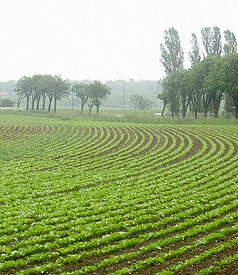A federal judge in California on Tuesday ordered the immediate destruction of 256 acres of Monsanto’s genetically modified (GM) sugar beet seedlings because the crops were planted in violation of federal law. The ruling is the first of its kind in the United States.
In 2009, Judge Jeffrey White found the US Department of Agriculture’s (USDA) 2005 decision to deregulate Monsanto’s Roundup Ready sugar beets to be unlawful because the USDA failed to conduct a complete environmental impact analysis. The ruling was the result of a lawsuit filed by farmers’ and consumer groups.
Earlier this year, the Center for Food Safety and Earthjustice, representing a coalition of groups concerned about GM sugar beets, asked the court to ban further planting of the beets until the USDA issued a full Environmental Impact Statement (EIS). White denied the initial request and allowed the past season’s beet crop to be processed due to economic concerns.
Monsanto’s Roundup Ready sugar beets now account for about 95 percent of sugar beets grown in the US, according to the USDA. The beets are genetically engineered to resist Roundup, Monsanto’s controversial glyphosate-based herbicide.
Sugar beets and sugar cane are the leading sources of manufactured sugar in the US, according to the USDA.
In August, White vacated the USDA’s initial decision to deregulate the Monsanto sugar beets and ruled that any future GM sugar beet plantings would be illegal until the USDA complied with federal law and issued a full EIS.
The USDA, however, granted special permits in September to four seed companies, allowing growers to plant GM sugar beet seed crops in Oregon and Arizona.
Consumer and organic farmers’ groups intervened with another lawsuit, and now these seed crops must be removed from the ground.
Help fight ignorance. Click here for free Truthout email updates.
In his ruling, Judge White wrote that the pre-emptive planting “created a significant risk of environmental harm” and noted that past containment issues proved that other crops were at risk of being cross-contaminated with Monsanto GM beet traits.
White wrote, “the legality of Defendants’ conduct does not even appear to be a close question,” noting that the USDA and Monsanto tried to bypass his prior ruling that made Roundup Ready sugar beets illegal.
“USDA thumbed its nose at the judicial system and the public by allowing this crop to be grown without any environmental review,” said Paul Achitoff , a plaintiff attorney for Earthjustice. “Herbicide-resistant crops just like this have been shown to result in more toxic chemicals in our soil and water.”
In October, Monsanto and its biotech partners submitted a request for partial deregulation of GM sugar beets, and the USDA is now considering special guidelines to allow farmers to plant GM sugar beets in 2011 while the department completes a full environmental impact analysis.
Glyphosate-based herbicides like Monsanto’s Roundup continue to be controversial. Glyphosate is a broad-spectrum herbicide that kills most plants besides the GM crops engineered to tolerate the chemical.
The widespread use of glyphosate and Roundup Ready crops have bred “superweeds” that have developed their own resistance to the herbicide, and the problem recently caught the attention of Congress and the national media.
In October, Monsanto announced a rebate program for farmers who use additional herbicides with glyphosate to combat the superweeds, and critics charge that Monsanto is only throwing more chemicals on a problem created by its technology.
Monsanto and government regulators consider glyphosate to be one of the safest herbicides on the market, and Roundup is now sprayed on fields across the world. The widespread use of glyphosate has sparked an international debate in the scientific community, and scientists in South America and Europe claim they have faced threats and intimidation for publishing studies showing that glyphosate-based herbicides are more dangerous to human health than regulators and the industry will admit.
Truthout recently reported on Dr. Andres Carrasco, an Argentina-based researcher, who was attacked by a mob in August before he was scheduled to give a talk on a study that linked widespread use of glyphosate to an increase in birth defects in agricultural areas.
The herbicide is giving Monsanto trouble in the US as well. A majority of the corn, soy and sugar beets grown in the US carry Monsanto’s glyphosate-resistant traits and require Monsanto-brand herbicide. Monsanto’s patent on glyphosate ran out a decade ago, but the company’s control of the market has sparked a federal antitrust investigation.
Media that fights fascism
Truthout is funded almost entirely by readers — that’s why we can speak truth to power and cut against the mainstream narrative. But independent journalists at Truthout face mounting political repression under Trump.
We rely on your support to survive McCarthyist censorship. Please make a tax-deductible one-time or monthly donation.
